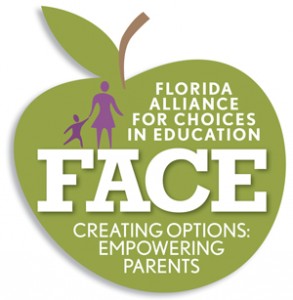Every morning, Kevin Gines gets up an hour earlier so his mom can drive him to a nearby public school, where the 16-year-old sophomore takes a naval science class. Then he heads to a private Christian academy in North Florida to finish the rest of his school day.

Florida private school student Kevin Gines makes the most of an opportunity to participate in a nearby public school's JROTC program.
“He’s really serious,’’ said Kevin’s father, Jesse, a security guard. “You should see how he shines his shoes. He’s already a soldier.’’
Kevin said he’s willing to make the extra effort because he knows it’s an opportunity he almost didn’t get. His school, the Christian Home Academy in Orange Park, doesn’t offer JROTC. So last May, the Gineses tried to sign up Kevin for the program at Middleburg High, a Clay County district school within minutes of their home.
School officials intervened, telling the Gineses that Kevin wasn’t eligible because he wasn’t enrolled in the public school, and that he couldn’t register for only one class. A high school in neighboring Duval County said Kevin could sign up for JROTC there, but it was too far for his mother to drive each day.
Kevin was about to give up, but not his dad. Jesse Gines combed through state statutes. He learned private school students are allowed to participate in extra-curricular activities at public schools, such as sports and gifted programs. So are homeschoolers and students taking classes through Florida Virtual School. There’s also a notice on the JROTC website that says students not enrolled at the school hosting the program can become special cadets.
But the district official overseeing enrollment wouldn’t budge. Kevin, who comes from a family of Marines, appeared to be caught in a gray area.
Then his dad reached out to Step Up For Students, the nonprofit that administers the Florida Tax Credit Scholarship. Kevin’s family uses the scholarship to send him and his little brother to Christian Home Academy. Step Up also co-hosts this blog.
We talked to JROTC officials as well as the state education commissioner at the time, Tony Bennett, and Clay County Superintendent Charlie Van Zant. Everyone agreed it would be a mistake if Kevin couldn’t join JROTC and follow his dream. (more…)
 At least 13 private schools that accept the Florida Tax Credit Scholarship have applied to administer the FCAT and end-of-course exams next year.
At least 13 private schools that accept the Florida Tax Credit Scholarship have applied to administer the FCAT and end-of-course exams next year.
The schools, mostly faith-based and in South and Central Florida, have submitted their applications to the Florida Department of Education, which will decide in August whether to approve them.
DOE spokeswoman Tiffany Cowie said there may be more schools that made the March 1 deadline, but the department won’t know the final number until the mail is cleared towards the end of the week.
A state law passed in 2012 allows private schools with at least one student receiving the tax credit scholarship to offer the Florida Comprehensive Assessment Test and/or end of course exams, which are required in public schools.
Of the 13 schools that applied, eight signed up only for EOCs.
“The FCAT is a dinosaur,’’ said Principal Sandra Basinger of St. Mary’s Catholic School in Brevard County, where her seventh- and eighth-graders hope to take EOCs in Algebra I and Geometry next spring.
Like a lot of Catholic schools, St. Mary’s administers the Iowa Test of Basic Skills to its students in grades 2-8. The test is as good as if not better than the FCAT, Basinger said. And with Florida phasing out the state assessment for other tests in line with the new Common Core standards, “really, I just don’t think it would be worth it,’’ she said.
James Herzog, associate director of education for the Florida Catholic Conference in Tallahassee, said in an email to redefinED that he has heard the same sentiment from other Catholic schools.
“From a practical standpoint, it would … not make any sense for Catholic schools (or most other nonpublic schools) to offer the FCAT for a year or two only and then have to switch again to something else … ,’’ he said.
Herzog originally anticipated 30 to 40 Catholic schools would apply to give the FCAT.
“Obviously, I was way off,’’ he said. (more…)
 In 2010, Doug Tuthill took a look around and realized he was living in a new era.
In 2010, Doug Tuthill took a look around and realized he was living in a new era.
“Florida had this rapidly expanding portfolio of school choice options,” said Tuthill, the president of Step Up For Students, which administers the state’s tax credit scholarship program. “Yet there was little dialogue among the groups representing those choices. We weren’t talking to each other about what was working, what wasn’t, and why.”
Several important players in this bourgeoning movement recognized the need for more collaboration. Florida Virtual School and Step Up For Students, among others, wanted to see the school choice movement united, so they could learn from each other and talk through any differences.
Thus, FACE was born.
Florida Alliance for Choices in Education, or FACE, is comprised of more than 50 members, representing a diverse coalition of organizations dedicated to providing Florida school children with more educational options. Such organizations include National Coalition of Public School Options, Florida Charter School Alliance, Foundation for Florida’s Future, and StudentsFirst - all coming together with the belief that, as the FACE website says, “State policy should enable all parents to be fully engaged in their children’s education and to access those learning options that best meet their children’s needs.”
Step Up For Students (which co-hosts this blog) staffed the initial effort. Three individuals - Wendy Howard, a parent advocate from Tampa; Jim Horne, a former legislator and state education commissioner; and Julie Young, president and CEO of Florida Virtual School - spent a year facilitating outreach and diplomacy, eventually bringing all components of choice together in one organization.
Florida is the first state to do this. (more…)
Teacher pay. Gov. Rick Scott says he wants to set aside enough money in this year’s budget to give every district teacher a $2,500 raise. Coverage from Tampa Bay Times, South Florida Sun Sentinel, Naples Daily News, Sarasota Herald Tribune, Associated Press, Tallahassee Democrat, Pensacola News Journal. Politics and poll numbers are at play, the HT also writes. Teachers "suspicious," writes the Lakeland Ledger. Teachers "skeptical," writes the Tampa Tribune. Teachers unions "cautiously optimistic," writes the Florida Times Union.
 Marco Rubio. The senator tells an audience at the U.S. Chamber of Commerce that he’ll be pushing education reform, even if it’s not the sexiest issue: “The good news is it’s not partisan, the good news is it’s something that there’s broad support for," he said. "The bad news is because it’s not partisan. Because it’s not controversial, it’s not getting nearly enough attention as it needs to be getting." The Hill.
Marco Rubio. The senator tells an audience at the U.S. Chamber of Commerce that he’ll be pushing education reform, even if it’s not the sexiest issue: “The good news is it’s not partisan, the good news is it’s something that there’s broad support for," he said. "The bad news is because it’s not partisan. Because it’s not controversial, it’s not getting nearly enough attention as it needs to be getting." The Hill.
Tony Bennett and the Legislature. Gov. Scott cancels his appearance before the Senate Education Committee, but Tony Bennett talks to senators about voucher accountability, Common Core, SB 736, etc. Coverage from redefinED, SchoolZone (two posts here and here) Gradebook (two posts here and here), StateImpact Florida and the Associated Press.
Slow down. Florida superintendents want a longer timeline to implement a suite of changes, including new tests and teacher evaluations, reports the Fort Myers News Press.
Charter schools. A new study based on Florida data suggests charter schools might not be any better than district schools at showing low-performing teachers the door. Shanker Blog.
Teacher preparation. The National Council for Teacher Quality gives Florida a B- (the best grade it gave any state) for its teacher preparation policies. SchoolZone. Sherman Dorn critique here. (more…)
To appreciate the significance of what Nikolai Vitti is saying about parental choice, one must first read his resume. He’s a 36-year-old with a Harvard education doctorate who served as chief academic officer to nationally recognized Miami-Dade school superintendent Alberto Carvalho before being chosen in the fall to run the Duval County school district, the 22nd largest in the nation.
So Vitti is, by anyone’s definition, a comer on the national public education scene.
And he says this: “I support choice because I think parents need options, especially those that do not have the financial means to go to a private school.”
And this: “I just don’t believe that anyone should tell a parent where they should send their child to school. I’m vehemently opposed to limiting options, especially to parents whose children are in lower performing schools or parents who don’t have the financial means to have the same flexibility that a parent would have of means. And that’s historically what’s happened with our public education system.”
These statements, in an enlightening podcast posted to this blog on Monday, are all the more impressive given that the school district he now commands has an uneasy history with private school choice. The pressure on him to continue to wage high-profile war is certainly great. But Vitti comes from a place, and perhaps a generation, where choice is not a dirty word. He openly praises charter operators such as KIPP, even borrowing from some of their practices while in Miami, and asserts that competition is making school districts up their game. In one of his first meetings on the new job, he recommended, and the school board approved, 12 new charter schools.
Vitti, then, is owed more than a pat on the back. He is also trying to break through the political divide to encourage open-minded debate on how to make choice actually work. Toward that end, he brings legitimate concerns to the table and needs to be heard. (more…)
 Words such as voucher, privatization, profit and corporation are often used as weapons by individuals and groups who oppose parental empowerment and school choice. Using words as weapons is especially common during periods of significant social change - we all do it - but the practice undermines civic discourse and makes finding common ground more difficult.
Words such as voucher, privatization, profit and corporation are often used as weapons by individuals and groups who oppose parental empowerment and school choice. Using words as weapons is especially common during periods of significant social change - we all do it - but the practice undermines civic discourse and makes finding common ground more difficult.
“Market” is another term school choice opponents use to connote evil, but our way of life is largely based on markets, and public education is increasingly embracing market processes as customized teaching and learning become more common. Our challenge moving forward is regulating public education markets in ways that maximizes their effectiveness and efficiency.
People access products and services in one of two ways. Either their government assigns them, or they choose for themselves. In the United States, we have historically allowed citizens to choose, and this system of provider and consumer choice is a “market.”
In a goods and services market, providers decide which goods and services they want to sell, and consumers choose those they want to buy. Markets, when implemented properly, are preferable to assignment systems because they better utilize people’s knowledge, skills and motivation. Citizens are allowed to use their own experiences and judgments when making selling and purchasing decisions, and this citizen empowerment maximizes the universe of ideas from which improvement and innovation derive.
When governments assign products and services to their citizens, they rely on a small group of people to decide what to offer. This top-down approach is less open, transparent and effective than the decision-making that occurs in markets, and it discourages creativity. This is why most improvements in goods and services emerge from market systems rather than government assignment systems.
Markets allow providers to learn from consumers. When governments dictate to consumers what goods and services they may have, their citizens’ true wants and needs are not fully considered. The voice of the customer is silent. But when consumers are empowered to choose for themselves, providers learn from these choices and adjust accordingly. In markets, this necessity to meet customers’ needs drives innovation and continuous improvement. (more…)
A bill filed in the Florida Legislature this week could give the families of disabled students quicker access to McKay Scholarships, state-funded vouchers for private schools, and likely result in an expansion of the $151 million program.
Senate Bill 172, sponsored by Sen. Miguel Diaz de la Portilla, R-Miami, nixes the requirement that students spend the prior school year in a Florida public school before becoming eligible for the scholarship. Similar bills were proposed in 2009, but died in committee.
The idea behind the public school rule, said Miami attorney Allison Hertog, an advocate for students with special needs and their parents, was to allow school districts time to get to know students and properly evaluate what kind of services they needed.
Then districts could develop a comprehensive education plan known as an IEP or 504 – a federally mandated road map that helps set a course for learning. The better the plan, Hertog said, the better the services and, ultimately, the more money families receive.
So why remove the requirement?
“When students struggle, the goal is to try to get them into the most successful environment as quickly as possible,’’ said Steve Hicks, president of the Coalition of McKay Scholarship Schools, which represents private schools that accept the scholarship dollars.
Families don’t necessarily want to wait a year before they can move their child into a better setting – and they shouldn’t have to, Hicks said.
“Kids, if they feel like they’re going to fail, they will shut down,’’ he said. “Trying to get them going again is very difficult. Our goal is to expand the program to allow parents to access immediately all the services available, whether it’s public or private school, tax credit scholarships, or whatever.’’
Call them Vouchers 2.0. In the age of customization, researcher Matthew Ladner sees education savings accounts as the tool for the times. Unlike vouchers or tax credit scholarships, ESAs would allow parents to use state funds to pay for a blend of K-12 educational options – schools, tutors, online programs, etc., in whatever combo works - and perhaps squirrel away some of those funds for college.
“We we like to say that ESAs are sort of school choice and parental control over education down to the last penny,” Ladner said in a podcast interview with redefinED. “What we really want to do is allow parents to customize the education for their child. Education shouldn’t be necessarily an all or nothing proposition - you’re either attending this school or that school. In fact, the whole definition of what a school is is being fairly rapidly changed by technology.”
Ladner is senior advisor of policy and research at the Foundation for Excellence in Education. He’s one of the creators of the ESA concept and its most diligent Johnny Appleseed. In October, the Friedman Foundation for Educational Choice published a report he authored about ESAs called, “The Way of the Future.” Ladner also was instrumental in creating the ESA program in Arizona, which to date is the only one in the country but was recently expanded.
A key feature of ESAs, Ladner said, is that it requires parents to make choices based on quality and price. That in turn will spur innovation and, at the same time, reign in costs that have risen steeply for decades with little improvement in academic outcomes. “If you want to reverse that, you have to do something that’s going to seem a little radical at first,” Ladner said. “But by giving parents complete control over the money and requiring them to consider possible alternative uses for that money, it really sets them up to be discriminating consumers.“
Florida lawmakers flirted with ESAs in 2011, with critics panning the idea as “universal vouchers” and “vouchers for all.” But Ladner said even if a state went “whole hog” with the idea, the vast majority of kids would remain in public schools, as the Florida experience has shown with McKay vouchers and tax credit scholarships. In his view, ESAs should also be designed for equity - with greater funding for students with greater needs.
Are people ready for ESAs? Maybe not just yet, Ladner said. But it took a while for people to catch on to Palm Pilots, too. “As a movement we always need to be taking a strong interest in the development of our product. And our product in this case is our methods to increasing the freedom and the effectiveness of parents the parents within the schooling system,” Ladner said. “I think there is work to be done. But I do think that when this work is done we will have a product that is clearly superior to the ones we have today.”
Critiquing the Florida Formula. Matt Di Carlo at the Shanker Blog is a critic to be taken seriously. In his latest post, he looks at the research that has evaluated different components in Florida’s reform effort, including the competitive pressures from vouchers, tax credit scholarships and charter schools. “As usual,” he writes, “it is a far more nuanced picture than supporters (and critics) would have you believe.”
Legislative wish list. What do education groups want from the coming legislative session? Florida Voices asks Ruth Melton at the Florida School Boards Association; Patricia Levesque at the Foundation for Florida’s Future; Mindy Gould at the Florida PTA; and Kathleen Oropeza at Fund Education Now. Lawmakers, Oropeza writes, are out to “starve public education” and have been “intentionally bringing districts to the brink of catastrophe.”
StudentsFirst report card. Coverage from Florida Today, Orlando Sentinel, StateImpact Florida, Education Week, Fort Myers News Press. Sherman Dorn’s take here.
Online testing problems. They’re still affecting the DOE’s FAIR system. Gradebook.
Jeb Bush headed to Arkansas. He’s scheduled to visit for National School Choice Week, reports Arkansasmatters.com.
More Newtown reaction. Tampa Bay Times. Palm Beach Post. Lakeland Ledger. In Lake County, a school board member wants teachers and principals to carry district-purchased guns, reports the Orlando Sentinel. In Manatee, the interim superintendent wants local law enforcement to inspect every inch of every public school campus, reports the Bradenton Herald.
Delinquency. In public schools, a Florida Department of Juvenile Justice report finds it's down by nearly half over the last eight years, reports News Service of Florida. (more…)